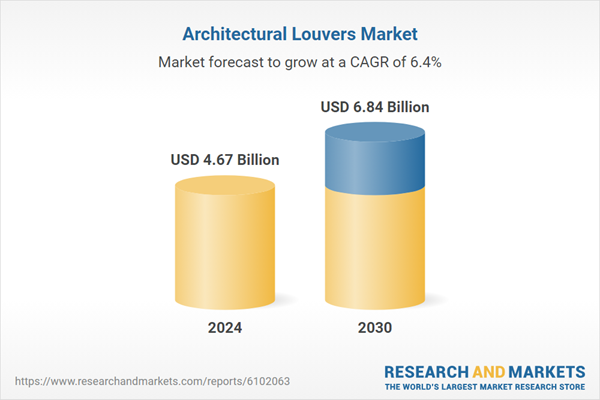Speak directly to the analyst to clarify any post sales queries you may have.
10% Free customizationThis report comes with 10% free customization, enabling you to add data that meets your specific business needs.
Commonly fabricated from aluminum, steel, wood, or composite materials, louvers are selected for their strength, weather resistance, and design adaptability. As sustainability becomes a core principle in modern construction, architectural louvers are increasingly integrated into building envelopes to support natural ventilation, reduce solar heat gain, and enhance overall energy efficiency. Their use in commercial, residential, and industrial buildings aligns with global energy codes and green building certifications, solidifying their importance in environmentally responsive design.
Key Market Drivers
Rising Demand for Energy-Efficient Building Solutions
The increasing focus on sustainable construction is driving demand for energy-efficient solutions, positioning architectural louvers as a key element in modern building designs. Louvers help improve air circulation and natural ventilation, minimizing the need for energy-intensive HVAC systems. By reducing heat gain and optimizing airflow, they enhance indoor thermal comfort while supporting compliance with international energy codes and green certifications. Builders and architects are prioritizing functional design elements that promote energy savings without compromising aesthetics, making louvers a popular choice. Government incentives and environmental regulations further encourage their adoption in both new constructions and retrofits, particularly in hot climates where louvers assist in shading and passive cooling strategies.Key Market Challenges
High Customization Demands and Complex Installation Requirements
The growing demand for customized louver systems tailored to specific architectural designs presents a significant challenge for manufacturers and installers. Clients frequently request bespoke configurations involving unique dimensions, materials, airflow control mechanisms, and compatibility with façade systems. This level of customization complicates manufacturing workflows, increases production costs, and extends lead times. Furthermore, the installation process often requires precise alignment and integration with diverse building structures, necessitating skilled labor and close coordination among multiple stakeholders. Variations in local building codes and site-specific conditions add further complexity, making standardized solutions difficult to implement and contributing to potential delays and budget overruns.Key Market Trends
Rising Demand for Energy-Efficient and Sustainable Building Solutions
A notable trend in the architectural louvers market is the growing adoption of sustainable and energy-saving designs. With heightened focus on reducing a building’s environmental footprint, louvers equipped with adjustable blades and sun control features are increasingly used to regulate daylight and airflow. These innovations help reduce energy consumption by minimizing reliance on artificial lighting and mechanical cooling systems. Materials like recyclable aluminum and corrosion-resistant steel are gaining popularity for their durability and environmental benefits. Additionally, smart louvers integrated with automation systems are becoming more common, allowing buildings to adapt in real-time to changing environmental conditions and further enhancing energy performance.Key Market Players
- Greenheck Fan Corporation
- Construction Specialties, Inc.
- Ruskin Company
- Airolite Company, LLC
- United Enertech Corporation
- Nystrom, Inc.
- Colt Group
- Waterloo Air Products Plc
- RENSON Ventilation
- Louvers & Dampers Inc.
Report Scope:
In this report, the Global Architectural Louvers Market has been segmented into the following categories, in addition to the industry trends which have also been detailed below:Architectural Louvers Market, By Material:
- Aluminum Louvers
- Steel Louvers
Architectural Louvers Market, By Application:
- Commercial Buildings
- Industrial Facilities
Architectural Louvers Market, By Type:
- Fixed Louvers
- Adjustable Louvers
Architectural Louvers Market, By End-Users:
- Architects & Designers
- Contractors
Architectural Louvers Market, By Region:
- North America
- United States
- Canada
- Mexico
- Europe
- France
- United Kingdom
- Italy
- Germany
- Spain
- Asia-Pacific
- China
- India
- Japan
- Australia
- South Korea
- South America
- Brazil
- Argentina
- Colombia
- Middle East & Africa
- South Africa
- Saudi Arabia
- UAE
- Kuwait
- Turkey
Competitive Landscape
Company Profiles: Detailed analysis of the major companies present in the Global Architectural Louvers Market.Available Customizations:
With the given market data, the publisher offers customizations according to a company's specific needs. The following customization options are available for the report.Company Information
- Detailed analysis and profiling of additional Market players (up to five).
This product will be delivered within 1-3 business days.
Table of Contents
Companies Mentioned
- Greenheck Fan Corporation
- Construction Specialties, Inc.
- Ruskin Company
- Airolite Company, LLC
- United Enertech Corporation
- Nystrom, Inc.
- Colt Group
- Waterloo Air Products Plc
- RENSON Ventilation
- Louvers & Dampers Inc.
Table Information
| Report Attribute | Details |
|---|---|
| No. of Pages | 180 |
| Published | June 2025 |
| Forecast Period | 2024 - 2030 |
| Estimated Market Value ( USD | $ 4.67 Billion |
| Forecasted Market Value ( USD | $ 6.84 Billion |
| Compound Annual Growth Rate | 6.4% |
| Regions Covered | Global |
| No. of Companies Mentioned | 10 |









